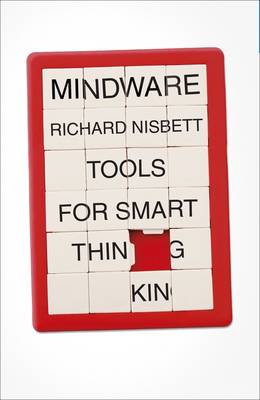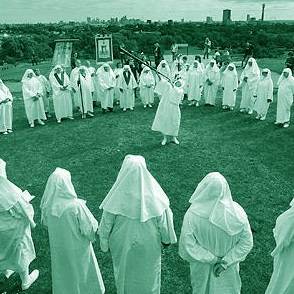Today, the notion of "smart-thinking" is ubiquitous. This huge publishing field was prefigured by the work of social psychologist Richard Nisbett who in 1977 published an empirically researched article that showed that many of our choices and preferences are influenced by factors outside our conscious awareness. This was ground-breaking and it became one of the most cited articles of the decade. Nisbett, who is Theodore M. Newcomb Distinguished Professor of social psychology and co-director of the Culture and Cognition programme at the University of Michigan, has published numerous books over his long career. The latest is Mindware: Tools for Smart Thinking. Here, he discusses some of his ideas.

Why did you decide to write this “guide to smart-thinking”?
I’ve studied reasoning for my whole career and I focused on errors people make. As I studied these areas, it began to dawn on me that a lot of the mistakes we make in everyday life could be avoided by using some of the tools for thinking that have been developed over the last 150 years. John Stuart Mill said that the logic of science is the logic of business and life, by which he meant there’s nothing esoteric or distinctive about scientific thinking: it’s just common sense. That was true in his day. It’s no longer true. There have been tremendous advances and statistics, economics, philosophy, logic – just a huge increase in the number of tools that we have for thinking about scientific problems. But these same tools are extremely useful, many of them, in everyday life, and that’s what this book is about – how to make contact with those tools and use them.
What are the most common errors in the way we think?
One of the very biggest is our inability to fully appreciate the implications of the law of large numbers. In principle it’s totally obvious – it just means that sample values, like the average for example, will resemble the true population value as a function of the size of the sample. You want to find out how people in Bangladesh feel about solar power, you don’t ask two people, you ask a couple of hundred. We understand that principle in situations that we represent to ourselves as highly variable.
For example, a football coach at Michigan recently watched a prospect from high school, extremely highly recommended by his coaches, great win-loss record, but the guy made a couple of serious errors and wasn’t in control of the ball. So the coach goes back and says, I don’t think we should pursue this kid, I don’t think he’s all that good. To anybody who knows sports that doesn’t seem wise. Athletic performance is extremely variable. If we understand the variability, we apply the law of large numbers: that’s not enough evidence. But what about a business manager who interviewed someone recently with a great business record, highly recommended by his superiors. But he interviews the guy and he seems uninspired. So the manager tells his colleagues, I don’t think we should pursue this guy. Most people say that’s reasonable. But it’s even less reasonable than the football coach. Typically an interview is a half hour, and if you represent that as a sample from a population – a population of what? The kind of thing he’ll be doing in everyday life? A lot of what goes on in interview hasn’t got much to do with performance as an executive.
We understand the principle in the abstract, we understand it where we see variability, but where we don’t see it, we don’t apply it, and that happens in our lives all the time.
So are we perceiving the world inaccurately?
We’re perceiving the world inaccurately all the time. We’re making poor predictions all the time, because we don’t recognise the variability of people in particular situations. People are well calibrated for abilities, they understand you need a lot of evidence and that the accuracy of a judgment grows as the evidence grows. But we have absolutely no recognition of that for personality. It’s stunning. If you behave honestly in one situation – terrific, I can count on her! But the correlation between two situations that track any personality trait is so low it’s almost negligible. If you get someone in 20 situations, and you’re honest in every one, I know I can trust you with my life. People don’t understand the difference between that lousy evidence from one occasion and the evidence that comes from many occasions.
Does it matter that we get these things wrong?
It matters hugely: it means that I hire the wrong person for the job. If you base your judgment entirely on interview, you have a 55 per cent chance of getting that right. If there’s information in the folder – grades, letters of recommendation, ability tests, and comparable kinds of evidence in the business world – those correlations are high enough that would give you a 70 per cent chance of getting it right. That can be the difference between success of an enterprise and failure.
Are humans inherently rational or irrational?
I’ve thought about that question enough that I find it totally confusing and I can’t answer it. There’s a long held philosophical position that you have to assume people are rational until proven otherwise. The point isn’t whether we’re rational. My work shows we make mistakes, but many of these errors can be overcome.
So it’s possible to teach reasoning?
The history of that question is interesting. For 2,500 years, everybody knew you could make people smarter by teaching them. Then psychologists got into the picture in the early 20th century, and on the basis of terribly slight evidence said you can’t teach general rules of reasoning, you can just teach people how to perform mental operations on particular kinds of concrete problems. That’s the position that held for 50 or 60 years. That was the state of affairs when I started – so much so that when I was finding these errors, I knew the correct view was that you can’t do anything as you can’t teach people highly general rules for thinking.
That turned out to be spectacularly wrong. There’s an expression, “if you use new vocabulary word twice, you’ll have it forever”. A lot of what we learn in school drops away because we don’t make much use of it With these inferential rules, the more you use them, the more ingrained they become, and the more ingrained they become, the more automatic, and the less likely we are to even recognise we even made a use of a rule.
One of the things I’ve studied a great deal is how little we know of how much goes on with the operations of our mind. Focusing on one particular rule, the law of large numbers, if I give a problem like that to people who have done two or three statistics courses, they give the correct answer based on a sophisticated application of the law of large numbers. They aren’t aware of using it, but they get it right.
What do you think of the UK government’s nudge unit, which is making use of these ideas as a political strategy?
It’s thrilling. So much of what we do is so easily avoided.
What’s your view of the publishing trend for books about smart-thinking, arguably kick-started by your research?
I think they’re going to make a difference. My criticism of my fellow researchers on reasoning is that they’re good at pointing out the problems, but not so great at pointing to the solutions. The nudge folks are a real exception to that, though it’s a limited number of principles they look at, just guides for action. Mostly the focus of my research is on much broader principles, rules for reasoning that are infinitely applicable.
You’ve written about the idea that cognition isn’t the same everywhere in the world. Could you expand?
I was convinced human beings are exactly the same with respect to everything, certainly with respect to reasoning. At that time I didn’t realise the huge extent to which it’s modified by learning and living and the world. I had this brilliant student from China, and after we’d known each other a while, he said, “Dick, you and I are quite different in the way we think”. He began to sketch the outline of what we and others ultimately established as a scientific fact. Westerners are analytic thinkers, we focus on some principle object, we look for its attributes, we try to think what the rules that apply to those attributes are, and we’re constantly modelling a world in terms of causal principles. It’s astonishingly different from East Asians. They are looking at the entire scene, the entire perceptual and conceptual scene, and the entire set of social factors operating in some situation. For different problems, different approaches are useful. Westerners make mistakes because they’re hyper logical sometimes – perhaps they didn’t pay attention to social context so they blunder around like a bull in a china shop. On the other hand, the holistic approach can cause logical errors as well. Sometimes the only way you’re going to get the problem right is to strip away the context and get it down to bare bones and that’s harder for East Asians to do than for Westerners.
Are there situations where we shouldn’t try to reason, and should rely on our intuition?
Sometimes you don’t have a choice. Gladwell’s book Blink is full of those situations – do I shoot or not shoot? I can’t stop and do a cost-benefit analysis: the likelihood he’ll shoot if I don’t shoot. You have to be instantaneous. But a huge number of the important decisions we make would benefit from a full cost benefit analysis. I don’t have quite the certainty about this as I do about the other things I’ve been talking about, but I believe that to be the case.
A friend of mine was making a choice about something that would be good for her romantic relationship but poor for her career, versus something not good for her romantic relationship but quite good for her career. So she sits and lists the costs and benefits. As she’s nearing the end, she says, damn it’s not working out right! I need some pluses no the other side. Well that’s her answer. Freud said, “In the most important matters of love and work, the unconscious should decide”. But I’d qualify that by saying, let’s prep the unconscious as best we can. The unconscious can use information too. So do your homework, think it through, and then do what really feels right.

